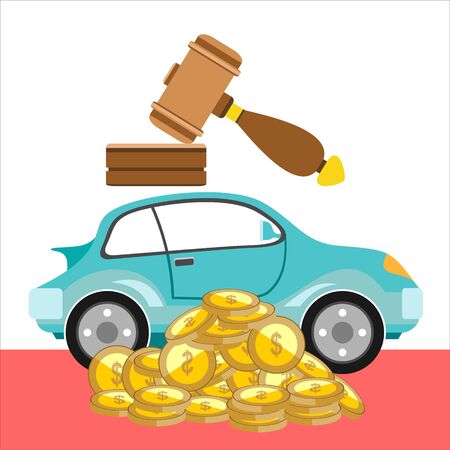1. Introduction to Car Finance in the UK
In recent years, the landscape of car ownership in the UK has undergone a significant transformation. Gone are the days when purchasing a car outright was the most common route for British drivers. Today, more and more consumers are opting for flexible car finance options such as Personal Contract Purchase (PCP), Hire Purchase (HP), and Leasing. This shift is fuelled by several factors, including rising vehicle prices, rapid depreciation of new cars, and the desire for manageable monthly payments rather than large upfront costs. As a result, finance packages now account for the majority of new car acquisitions across the country, making it essential for consumers to understand their choices before signing on the dotted line. Whether youre a first-time buyer or looking to upgrade your vehicle, navigating the various finance solutions can seem daunting. This guide will break down how each option works, why they have become so popular in the UK, and what you should consider to make a financially sound decision tailored to your needs.
2. What is PCP (Personal Contract Purchase)?
Personal Contract Purchase, commonly known as PCP, is one of the most popular car finance options in the UK. It combines elements of both leasing and traditional hire purchase, offering flexibility at the end of your agreement. Here’s a breakdown of how PCP works and what you should consider:
How Does PCP Work?
With PCP, you make an initial deposit followed by fixed monthly payments over an agreed period, typically between 24 to 48 months. Unlike Hire Purchase (HP), these payments only cover the depreciation of the vehicle rather than its full value.
| PCP Key Features | Description |
|---|---|
| Initial Deposit | Usually 10-20% of the cars value |
| Monthly Payments | Lower than HP as you’re not paying off the full car value |
| Agreement Length | Commonly 2-4 years |
| End-of-Term Options | Return, pay balloon payment to keep, or part-exchange for a new car |
| Mileage Limitations | Typically 8,000-12,000 miles per year; excess mileage charges apply |
| Condition Restrictions | The car must be returned in good condition; damages can incur fees |
Mileage and Condition Restrictions
PCP agreements come with strict annual mileage limits—exceeding these can result in additional charges at the end of your term. Similarly, you are expected to keep the vehicle in good condition; any excessive wear and tear will also lead to extra costs.
Who is PCP Most Suitable For?
- Drivers who like changing cars frequently: If you prefer upgrading your vehicle every few years, PCP offers that flexibility.
- Those seeking lower monthly payments: Compared to HP, monthly outgoings are usually more affordable with PCP.
- People unsure about long-term ownership: At contract’s end, you can choose whether to buy, return, or upgrade.
- Mileage-conscious drivers: Best for those confident they’ll stay within set mileage limits.
Summary Table: Is PCP Right for You?
| You Want To… | PCP Suitability |
|---|---|
| Own the car outright eventually | Possible (with balloon payment) |
| Keep monthly payments low | Yes |
| Avoid long-term commitment to one vehicle | Yes – option to hand back or part-exchange at end of term |

3. What is HP (Hire Purchase)?
When considering car finance options in the UK, Hire Purchase (HP) stands out as a straightforward and popular method, especially for buyers who wish to own their car outright at the end of the agreement. Understanding how HP works, its payment structure, and the advantages and disadvantages can help you decide if it aligns with your financial goals.
How Does Hire Purchase Work?
With a Hire Purchase agreement, you typically pay an initial deposit (usually 10% of the car’s value) followed by fixed monthly instalments over an agreed period, commonly between 2 to 5 years. Once all payments are made, ownership of the vehicle is transferred to you. Unlike PCP, there is no large final balloon payment; instead, your monthly payments are usually higher as you’re paying off the entire value of the car (minus any deposit).
Typical HP Payment Structure
| Payment Stage | Description |
|---|---|
| Deposit | Usually 10% of vehicle’s value, paid upfront |
| Monthly Payments | Fixed amounts over 24-60 months (covers full cost minus deposit) |
| Ownership Transfer | Car becomes yours after last payment; sometimes a small “option to purchase” fee applies |
Pros and Cons of HP for Different Buyers
| Buyer Type | Pros | Cons |
|---|---|---|
| First-time Buyers | Straightforward terms No mileage restrictions Eventual ownership |
Larger monthly payments Commitment to long-term contract |
| Budget-conscious Drivers | No large final payment Easy budgeting due to fixed rates Flexible deposit options |
No option to return the car early without penalty Must keep up with payments or risk repossession |
| Drivers Who Keep Cars Long-term | You own the vehicle at end No need to worry about condition at hand-back Suitable for high-mileage users |
Total cost may be higher than buying outright Responsible for maintenance and depreciation after purchase |
Is HP Right for You?
If your priority is eventual ownership and you prefer predictable costs without a large lump sum at the end, Hire Purchase could be an ideal solution. However, it’s important to assess whether you can afford higher monthly payments and are committed to keeping the same car for several years. Always compare this against PCP and leasing options to make an informed decision that fits your financial circumstances and driving needs.
4. Understanding Car Leasing (Personal Contract Hire)
Car leasing, known in the UK as Personal Contract Hire (PCH), is becoming an increasingly popular alternative to traditional car ownership. Unlike PCP or HP, with PCH you never actually own the vehicle; instead, you pay a fixed monthly fee to use the car for a set period, typically between two and four years. This arrangement offers unique advantages in terms of flexibility and budgeting, but also comes with its own set of considerations.
How Does Personal Contract Hire Work?
With PCH, you simply select your preferred make and model, agree on the contract length and mileage allowance, and pay an initial rental followed by fixed monthly payments. At the end of the term, you return the car to the leasing company without any obligation to buy or worry about depreciation.
| Feature | PCH (Leasing) |
|---|---|
| Ownership | No – you return the car at contract end |
| Upfront Payment | Initial rental (usually 3-6 months’ payments) |
| Monthly Cost | Fixed, often lower than PCP/HP |
| Mileage Limit | Yes – excess mileage charges apply |
| Maintenance Options | Can be included for a fee |
The Flexibility of Leasing
PCH can be especially attractive if you enjoy driving a new car every few years without the hassle of selling or trading in your old vehicle. It’s also ideal for those who want predictable motoring costs and minimal financial commitment beyond regular payments. Maintenance packages can often be bundled into your lease, simplifying budgeting even further.
What to Consider Before Leasing
- If you exceed your agreed mileage limit or return the car with damage beyond fair wear and tear, additional charges will apply.
- You must maintain comprehensive insurance throughout the lease term.
- You are committed to the full contract duration; ending it early usually incurs significant penalties.
Is Leasing Right for You?
Leasing suits those who value convenience, want to avoid ownership risks like depreciation, and prefer regularly updating their vehicle. However, if you drive high annual mileages or desire long-term ownership, leasing may not provide the best value. Always compare total costs and check what’s included before signing up for a PCH agreement.
5. PCP vs HP vs Leasing: Key Differences
When considering car finance options in the UK, understanding the core differences between Personal Contract Purchase (PCP), Hire Purchase (HP), and Leasing is essential. Each option caters to different needs, financial circumstances, and long-term goals. Below is a side-by-side comparison of their main features, typical costs, and the implications they carry for car ownership and your finances.
| PCP | HP | Leasing | |
|---|---|---|---|
| Ownership | Option to buy at end with balloon payment | Own after final payment | No ownership, return car at end of term |
| Deposit Required | Usually 10%+ | Usually 10%+ | Typically 3-6 months’ rental upfront |
| Monthly Payments | Lower than HP; higher than leasing in some cases | Higher than PCP; fixed throughout term | Tend to be lower; fixed by contract |
| Mileage Limits | Yes; excess mileage charges apply | No formal limit | Strict limits; penalties for excess mileage |
| Flexibility at End of Term | Buy, part-exchange, or return car | Keep or sell car as you own it outright | Return car or start a new lease; no purchase option generally |
| Total Cost Over Term* | Mid-range, can be higher if you buy the car at end | Tends to be highest if keeping car long-term due to interest paid on full amount borrowed | Tends to be lowest if only looking for use over short period without ownership aspirations |
| Early Termination Fees** | Likely, can be expensive depending on contract terms | Possible but may involve paying off remaining balance plus fees | Often significant, especially early in contract period |
| Maintenance & Repairs Included? | No (optional add-on) | No (owner’s responsibility) | Sometimes included as part of lease package options |
| Best For… | If you want flexibility and lower monthly payments with an option to own at the end. | If you intend to keep the vehicle long-term and eventually own it outright. | If you prioritise driving a new car every few years with minimal hassle and no intention of owning. |
*Total cost varies based on deposit size, agreement length, interest rates and whether you buy the car (for PCP/HP).
**Always check your specific agreement for details as terms vary across providers.
This comparison aims to help you match your financial priorities—be it cash flow management, long-term value, or flexibility—to the most suitable car finance solution available in the UK market.
6. Which Car Finance Option is Right for You?
Choosing between PCP, HP, and Leasing largely depends on your individual needs, financial situation, lifestyle, and plans for the future. Each option has its own advantages and potential drawbacks, so it’s essential to consider what matters most to you. Below is a handy guide to help you assess which finance method might best fit common UK scenarios:
| Scenario | Best Option | Why? |
|---|---|---|
| Want a new car every few years without the hassle of selling | Leasing or PCP | You can drive a new vehicle regularly, enjoy lower monthly payments, and avoid worries about depreciation or resale. |
| Plan to own your car long-term with no final payment worries | HP (Hire Purchase) | Once all payments are made, the car is yours outright—ideal for those who want full ownership and no balloon payment at the end. |
| Need flexibility with future decisions (buy or return) | PCP (Personal Contract Purchase) | Gives you options at the end of the term: buy the car, part-exchange for a new one, or simply return it. |
| Fixed monthly budget with minimal upfront cost | Leasing | Usually requires a lower initial payment and offers predictable monthly costs; perfect if you prefer budgeting certainty. |
| Mileage varies significantly year to year | HP | No mileage restrictions compared to PCP or Leasing agreements, making it suitable for unpredictable driving habits. |
Key Considerations Before Deciding
- Your Budget: Assess what you can comfortably afford each month, including insurance and running costs.
- Lifestyle Needs: If you drive high mileage or want to modify your car, HP may be better. Leasing and PCP often come with mileage caps and restrictions on modifications.
- Long-Term Plans: If you see yourself changing cars frequently, Leasing or PCP offers greater flexibility. For those wanting long-term value, HP could be more cost-effective in the long run.
- Your Credit Score: Some finance deals are only available to those with good credit ratings. Always check eligibility before applying.
A Final Word: Matching Your Choice to UK Life
The right finance option should align with your current circumstances and future goals. Young professionals in cities might favour Leasing or PCP for flexibility and access to newer models, while families seeking stability and long-term value may prefer HP. Remember to compare offers from different providers and read all terms carefully before signing any agreement. When in doubt, seek advice from a qualified financial adviser who understands the nuances of the UK car market.
7. Final Thoughts and Next Steps
Choosing the right car finance option in the UK—whether it’s PCP, HP, or Leasing—ultimately comes down to your individual needs, financial situation, and long-term plans. Here’s a summary table to help you quickly compare these options:
| Finance Option | Best For | Key Advantages | Potential Drawbacks |
|---|---|---|---|
| PCP (Personal Contract Purchase) | Drivers who like flexibility and changing cars every few years | Lower monthly payments, flexible end-of-contract choices (buy, return, or part-exchange) | Mileage limits, charges for excess wear/tear, large final balloon payment if buying |
| HP (Hire Purchase) | Those aiming for outright ownership at the end of the agreement | Straightforward structure, no mileage limits, own the car after final payment | Higher monthly payments compared to PCP, less flexibility mid-term |
| Leasing (Personal Contract Hire) | People who want a new car every 2-4 years without ownership worries | No depreciation concerns, often includes maintenance, simple budgeting | No option to buy, strict mileage limits and condition requirements |
Practical Advice for Your Next Car Finance Decision
- Assess your priorities: Do you want to eventually own the car, or are you more interested in lower monthly costs and driving the latest models?
- Budget realistically: Factor in all costs—not just monthly payments but deposits, potential fees for excess mileage or damage, insurance, and maintenance.
- Review the terms carefully: Always read the small print on contract length, mileage limits, early termination penalties, and what happens at the end of the agreement.
- Shop around: Don’t settle for the first offer. Compare deals from multiple providers and consider using a broker for additional guidance.
- Consider future needs: Think about changes in your lifestyle or work situation that may affect your use of the vehicle over the next few years.
Your Next Steps
- Use online calculators: Many UK finance providers offer tools to estimate monthly payments for each type of finance agreement based on your deposit and preferred contract length.
- Check your credit score: This will influence what deals are available to you and how much interest you’ll pay.
- If uncertain, seek advice: An independent financial adviser can help ensure your decision fits with your overall financial goals.
A Balanced Approach Ensures Peace of Mind
Selecting between PCP, HP, and Leasing isn’t just about getting a new set of wheels—it’s about making a well-informed choice that supports both your mobility and financial wellbeing. Take your time to research all options thoroughly; with careful planning, you’ll drive away confident you’ve chosen the best route for your circumstances in today’s UK market.


